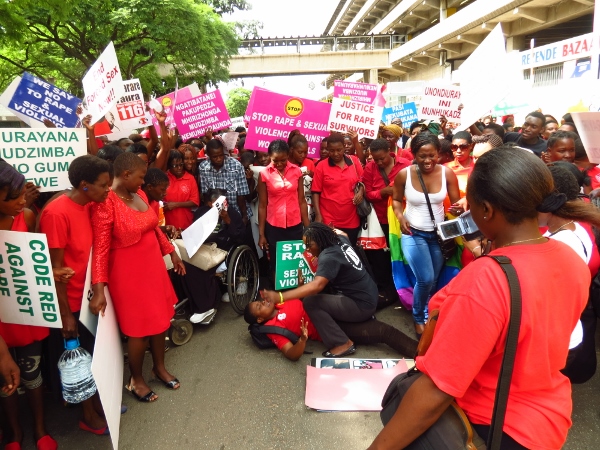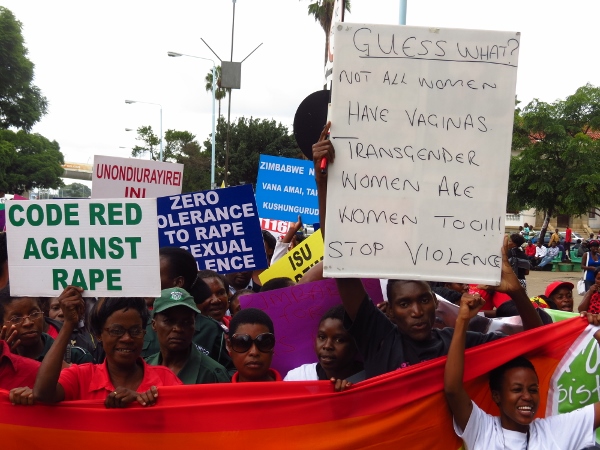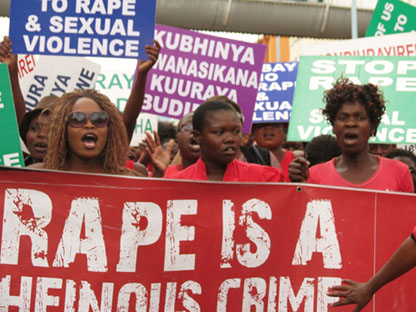Over four hundred women are waiting in front of Harare Town House, a spot that once marked the centre of the city. There are all sorts of women in the crowd—the young and the less young, some with babies swaddled on their backs and others holding brightly-coloured placards with messages on them that say things like ‘End Violence Now’ and ‘We are Tired, Stop Rape!’ They all have one thing in common: they are draped in the colour red. Whether they’re wearing scarlet caps or crimson blouses, skirts, dresses, t-shirts, shoes, even some of the babies are wearing red too.
On February 14th, Zimbabwean women came together to take a stand against rape and sexual violence against women. It was an awe-inspiring sight, in a country where protest and free speech are heavily-monitored and often restricted, to see women streaming in the middle of a busy Harare morning, halting traffic as they shouted slogans, sang songs of solidarity and made themselves heard across the nation. Women walked four blocks from Town House to the Harare Gardens in a peaceful protest to End Rape Now and sign a petition that was later presented to the women’s ministry on International Women’s Day (March 8).
Here are seven things that struck us about this historic moment!
- What’s in the colour red? Red has many meanings attached to it. It’s the colour of love, of passion, of blood, of emergency, of rebellion. There was something striking about seeing hundreds of women dancing through the streets in red, saying HEAR us, SEE us.
- Prayer as a feminist weapon. Sex worker activist, Miriam* said the opening prayer at the post-march gathering. Using prayer as a subversive political tool, Miriam highlighted the contradictions of society that depicts women as weaker and lesser beings and celebrated the power and strength of women. She called on God to hear the plea of women of Zimbabwe and to relay that message to His Excellency the President of Zimbabwe that women demand the recognition of bodily autonomy and want to be treated as equal citizens regardless of how patriarchal society has ensured they are not.
- Carving out space in a context where it is not easy. In order to convene any sort of process in Zimbabwe, organisations must seek a police clearance. This time, the protest organisers were only granted a very short route so as not to “inconvenience” drivers on the roads. But this didn’t deter women from making the most of that limited space—taking an hour to walk a route that normally takes fifteen minutes! Women activists brought traffic to a standstill, people sitting in their offices leaned out of their windows to watch and listen to the marchers singing. Women used flash theatre, mimes, crying, rolling on the ground as they cried for justice for rape survivors and respect for women’s bodies. It was a powerful spectacle.

- What is love? The March was held on Valentine’s Day, a day that is meant to celebrate “love” in all its forms. As Winnet put it, “I have few reasons to celebrate Valentine’s Day as long as there is a woman out there who is facing violence.” For so long women of Zimbabwe have been told to keep quiet but they will be quiet no longer. There was something potent about women standing up to decry the atrocities and wars that play out regularly on their bodies on a day that they we are supposed to celebrate love.
- This was a march for ALL women. The number and sheer diversity of women and men who participated in the march was striking—there was a great deal of solidarity and unity. Organisations who are part of the Women’s Coalition of Zimbabwe, as well as allies including Padare (a men’s group), Childline, GALZ (Gays and Lesbians of Zimbabwe) and more!
- Women’s voices are powerful. At heart, the march was a powerful expression of women’s voices that said loud and clear that women may face violations and struggle daily to survive in difficult contexts but they will come together to speak out on the issues that sit in their hearts.
- Holding political representatives accountable. The petition, developed by representatives from Women’s Coalition articulated not just the need to prevent violence but also demanded justice for rape survivors. Women are not interested in empty promises made by politicians and “allies” in the heat of the moment. The marchers are also committed to ensuring that rape survivors and their families receive adequate psychosocial support programming.
This blog was co-written by Maggie Mapondera & Winnet Shamuyarira of Katswe Sistahood.
*Miriam’s real name has been changed.





